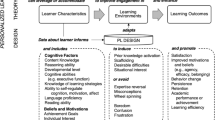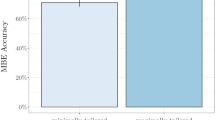Abstract
We propose a hybrid local search algorithm for the solution of the Curriculum-Based Course Timetabling Problem and we undertake a systematic statistical study of the relative influence of the relevant features on the performances of the algorithm. In particular, we apply modern statistical techniques for the design and analysis of experiments, such as nearly orthogonal space-filling Latin hypercubes and response surface methods. As a result of this analysis, our technique, properly tuned, compares favorably with the best known ones for this problem.
Similar content being viewed by others
References
Adenso-Diaz, B., & Laguna, M. (2006). Fine-tuning of algorithms using fractional experimental designs and local search. Operations Research, 54(1), 99–114.
Anagnostopoulos, A., Michel, L., Van Hentenryck, P., & Vergados, Y. (2006). A simulated annealing approach to the traveling tournament problem. Journal of Scheduling, 9(2), 177–193.
Bang-Jensen, J., Chiarandini, M., Goegebeur, Y., & Jørgensen, B. (2007). Mixed models for the analysis of local search components. In T. Stützle, M. Birattari, & H. Hoos (Eds.), Lecture notes in computer science: Vol. 4638. Engineering stochastic local search algorithms (SLS-2007) (pp. 91–105). Berlin: Springer.
Bonutti, A., De Cesco, F., Di Gaspero, L., & Schaerf, A. (2010) Benchmarking curriculum-based course timetabling: formulations, data formats, instances, validation, visualization, and results. Annals of Operations Research. doi:10.1007/s10479-010-0707-0
Box, G. E. P., Hunter, J. S., & Hunter, W. G. (2005). Statistics for experimenters: design, innovation, and discovery (2nd ed.). New York: Wiley-Interscience.
Burke, E. K., McCollum, B., Meisels, A., Petrovic, S., & Qu, R. (2007). A graph-based hyper-heuristic for educational timetabling problems. European Journal of Operational Research, 176(1), 177–192.
Burke, E. K., Mareček, J., Parkes, A. J., & Rudová, H. (2008a). Penalising patterns in timetables: Novel integer programming formulations. In S. Nickel & J. Kalcsics (Eds.), Operations research proceedings 2007. Berlin: Springer.
Burke, E. K., Mareček, J., Parkes, A. J., & Rudová, H. (2008b). A branch-and-cut procedure for the Udine corse timetabling. In E. Burke & M. Gendreau (Eds.), Proceedings of the 7th international conference on the practice and theory of automated timetabling (PATAT-2008).
Causmaecker, P. D., Demeester, P., & Vanden Berghe, G. (2009). A decomposed metaheuristic approach for a real-world university timetabling problem. European Journal of Operational Research, 195(1), 307–318.
Chiarandini, M., Fawcett, C., & Hoos, H. H. (2008). A modular multiphase heuristic solver for post enrolment course timetabling. In E. Burke & M. Gendreau (Eds.), Proceedings of the 7th international conference on the practice and theory of automated timetabling (PATAT-2008).
Cioppa, T. M., & Lucas, T. W. (2007). Efficient nearly orthogonal and space-filling Latin hypercubes. Technometrics, 49(1), 45–55.
Coy, S. P., Golden, B. L., Runger, G. C., & Wasil, EA (2001). Using experimental design to find effective parameter settings for heuristics. Journal of Heuristics, 7, 77–97.
Di Gaspero, L., & Schaerf, A. (2006). Neighborhood portfolio approach for local search applied to timetabling problems. Journal of Mathematical Modeling and Algorithms, 5(1), 65–89.
Di Gaspero, L., McCollum, B., & Schaerf, A. (2007). The second international timetabling competition (ITC-2007): Curriculum-based course timetabling (track 3) (Tech. Rep. QUB/IEEE/Tech/ITC2007/CurriculumCTT/v1.0/1). School of Electronics, Electrical Engineering and Computer Science, Queen’s University, Belfast (UK), ITC-2007 site: http://www.cs.qub.ac.uk/itc2007/.
Gendreau, M., Hertz, A., & Laporte, G. (1994). A tabu search heuristic for the vehicle routing problem. Management Science, 40(10), 1276–1290.
Glover, F., & Laguna, M. (1997). Tabu search. Dordrecht: Kluwer Academic.
Hoos, H. H., & Stützle, T. (2005). Stochastic local search—foundations and applications. San Francisco: Morgan Kaufmann.
Hothorn, T., Hornik, K., van de Wiel, M. A., & Zeileis, A. (2008). Implementing a class of permutation tests: The coin package. Journal of Statistical Software, 28(8), 1–23. http://www.jstatsoft.org/v28/i08.
Hutter, F., Hoos, H. H., & Stützle, T. (2007). Automatic algorithm configuration based on local search. In R. C. Holte & A. Howe (Eds.), Proceedings of the 22nd AAAI conference on artificial intelligence, July 22–26, 2007, Vancouver, British Columbia, Canada (pp. 1152–1157).
Kirkpatrick, S., Gelatt, C. D. Jr., & Vecchi, M. P. (1983). Optimization by simulated annealing. Science, 220, 671–680.
Kleijnen, J. P. C., Sanchez, S. M., Lucas, T. W., & Cioppa, T. M. (2005). A user’s guide to the brave new world of designing simulation experiments. INFORMS Journal on Computing, 17, 263–289.
Lach, G., & Lübbecke, M. (2008a). Curriculum based course timetabling: Optimal solutions to the Udine benchmark instances. In E. Burke & M. Gendreau (Eds.), Proceedings of the 7th international conference on the practice and theory of automated timetabling (PATAT-2008).
Lach, G., & Lübbecke, M. E. (2008b). Optimal university course timetables and the partial transversal polytope. In C. C. McGeoch (Ed.), Lecture notes in computer science: Vol. 5038. Experimental algorithms, 7th international workshop, WEA 2008 (pp. 235–248). Berlin: Springer.
Lü, Z., & Hao, J. K. (2010). Adaptive tabu search for course timetabling. European Journal of Operational Research, 200(1), 235–244.
Lucas, T. W., & Sanchez, S. M. (2005). Nolh designs spreeadsheet. http://diana.cs.nps.navy.mil/SeedLab/, visited on August 11, 2010.
McCollum, B., Schaerf, A., Paechter, B., McMullan, P., Lewis, R., Parkes, A. J., Di Gaspero, L., Qu, R., & Burke, E. K. (2010). Setting the research agenda in automated timetabling: The second international timetabling competition. INFORMS Journal on Computing, 22(1), 120–130.
Müller, T. (2008). ITC2007 solver description: A hybrid approach. In E. Burke & M. Gendreau (Eds.), Proceedings of the 7th international conference on the practice and theory of automated timetabling (PATAT-2008).
Murray, K. S., Müller, T., & Rudová, H. (2007). Modeling and solution of a complex university course timetabling problem. In Lecture notes in computer science: Vol. 3867. Practice and theory of automated timetabling VI (pp. 189–209). Berlin: Springer.
Myers, R. H. Montgomery, D. C. (2002). Response surface methodology (2nd ed.). New York: Wiley.
Paquete, L., Chiarandini, M., & Basso, D. (Eds.) (2006). Proceedings of the workshop on empirical methods for the analysis of algorithms, EMAA 2006. Reykjavik, Iceland.
Pinheiro, J. C., & Bates, D. M. (2000). Mixed-effects models in S and S-plus. Berlin: Springer.
R Development Core Team (2008). R: A language and environment for statistical computing. Vienna: R Foundation for Statistical Computing. http://www.R-project.org.
Ridge, E., & Kudenko, D. (2006). Sequential experiment design for screening and tuning parameters of stochastic heuristics. In L. Paquete, M. Chiarandini, & D. Basso (Eds.), Proceedings of the 1st workshop on empirical methods for the analysis of algorithms at the ninth international conference on parallel problem solving from nature (PPSN), Reykjavik, Iceland (pp. 27–34).
Ridge, E., & Kudenko, D. (2007). Tuning the performance of the mmas heuristic. In T. Stützle et al. (Ed.), Lecture notes in computer science: Vol. 4638. Engineering stochastic local search algorithms. Designing, implementing and analyzing effective heuristics, international workshop, SLS 2007, Proceedings, Brussels, Belgium, September 6–8, 2007 (pp. 46–60). Berlin: Springer.
Ryan, T. P. (2007). Modern experimental design. New York: Wiley.
Stützle, T., Birattari, M., & Holger, H. H. (Eds.) (2007). Engineering stochastic local search algorithms. In Lecture notes in computer science: Vol. 4638. Designing, implementing and analyzing effective heuristics, international workshop, SLS 2007, Brussels, Belgium, September 6–8, 2007, Proceedings. Berlin: Springer.
Author information
Authors and Affiliations
Corresponding author
Additional information
This work has been partly supported by the Italian Ministry for Education, University and Research (MIUR) under the grant PRIN 2008.
Rights and permissions
About this article
Cite this article
Bellio, R., Di Gaspero, L. & Schaerf, A. Design and statistical analysis of a hybrid local search algorithm for course timetabling. J Sched 15, 49–61 (2012). https://doi.org/10.1007/s10951-011-0224-2
Published:
Issue Date:
DOI: https://doi.org/10.1007/s10951-011-0224-2




